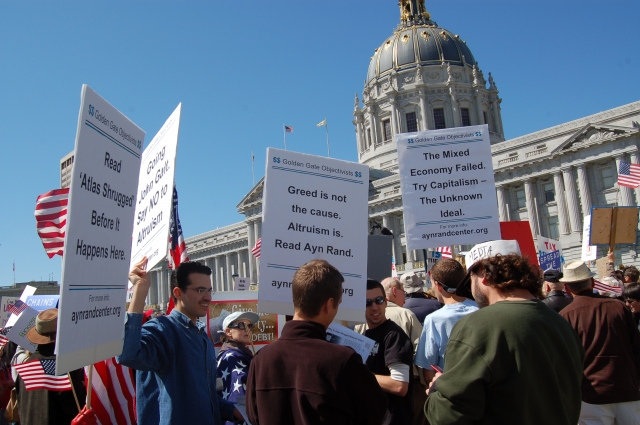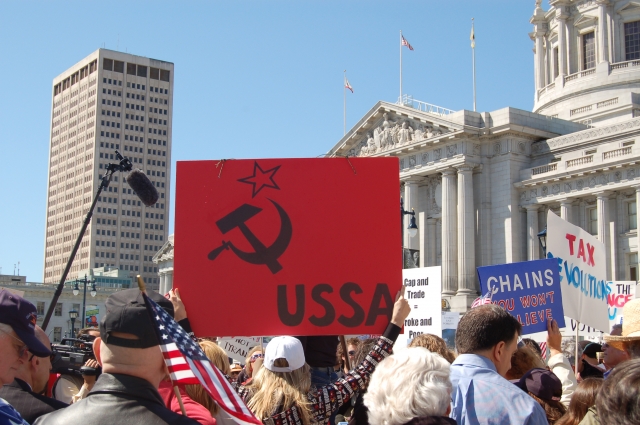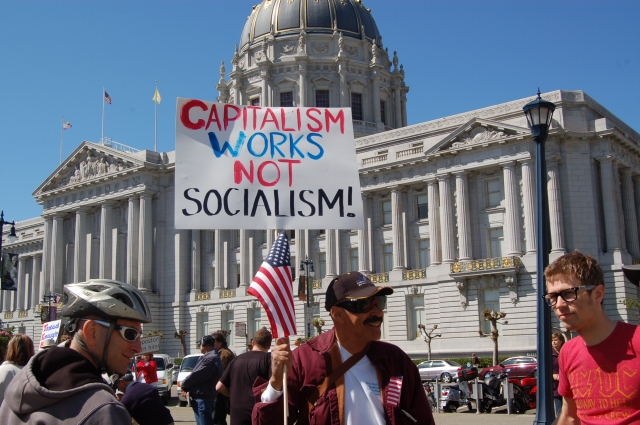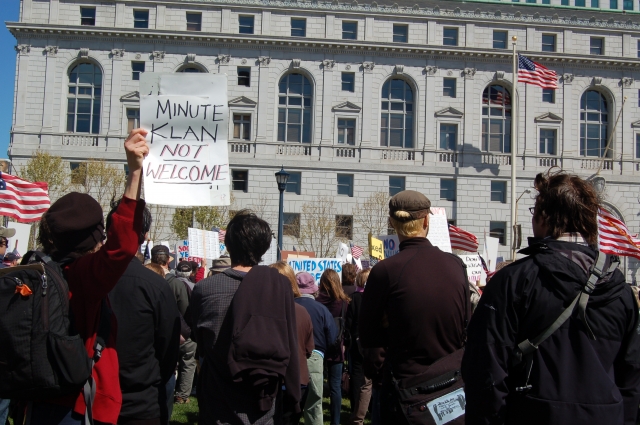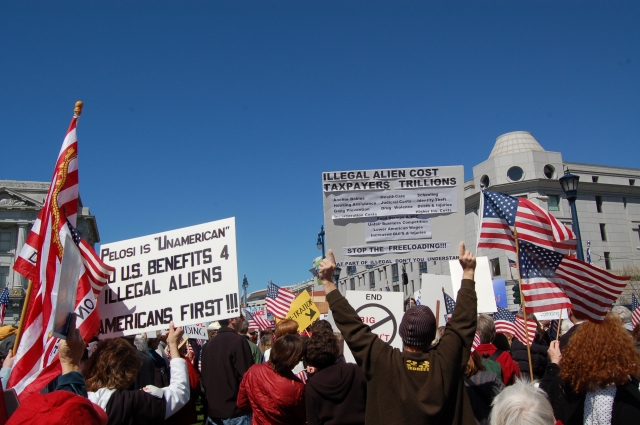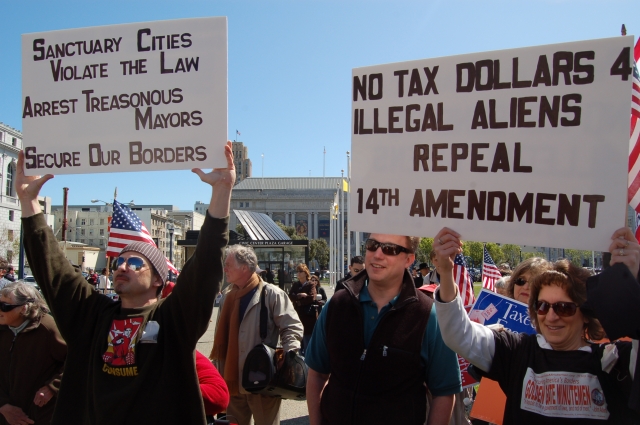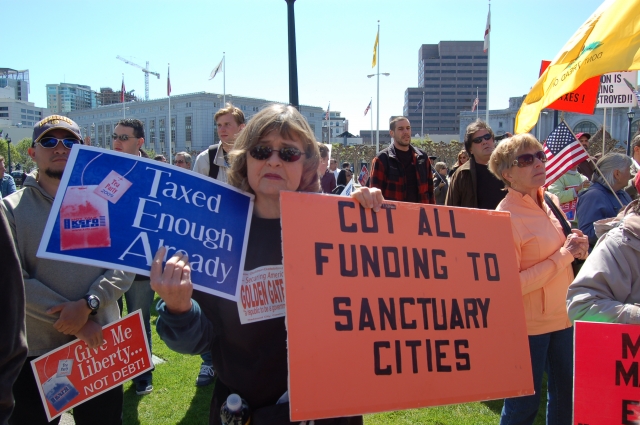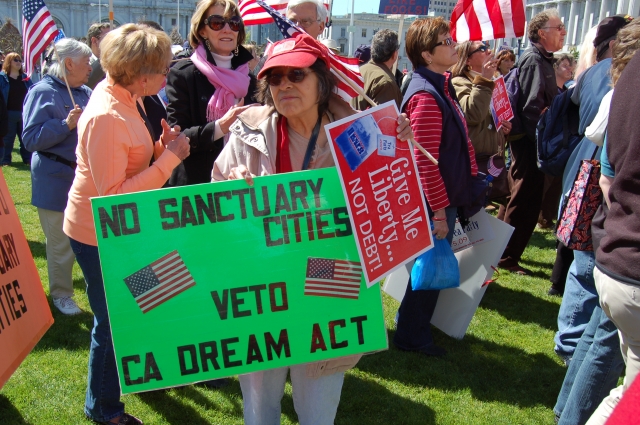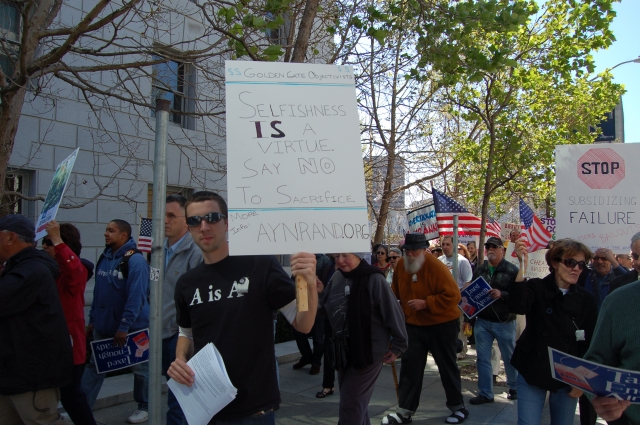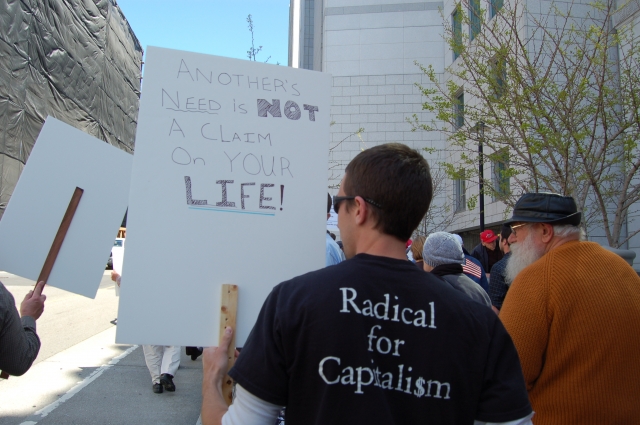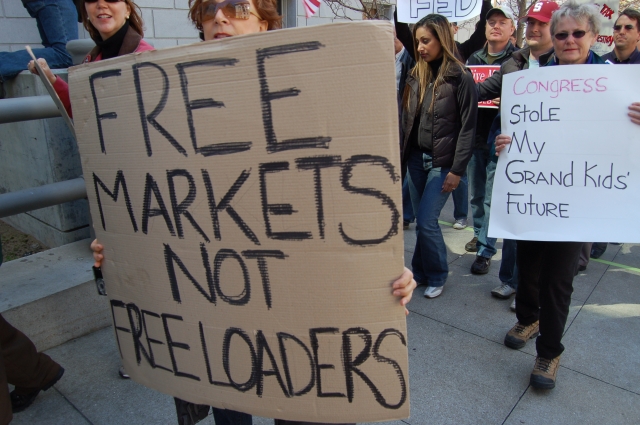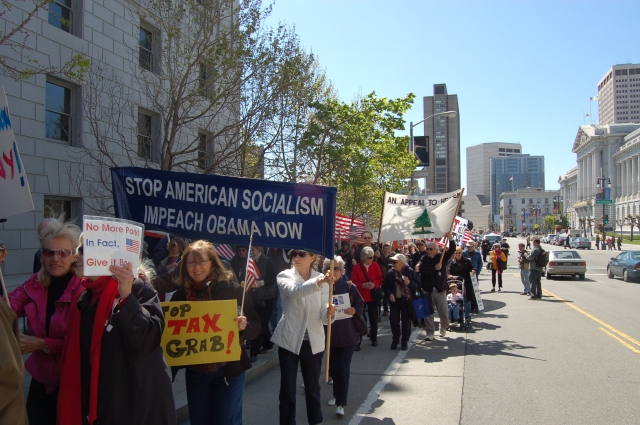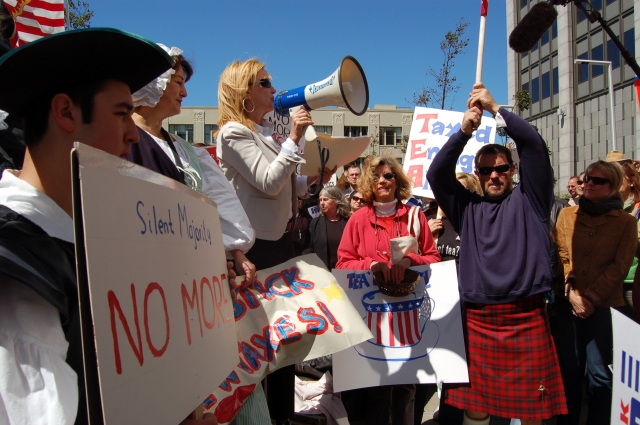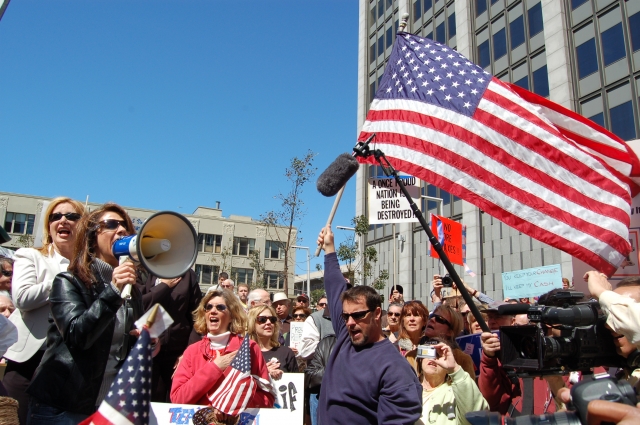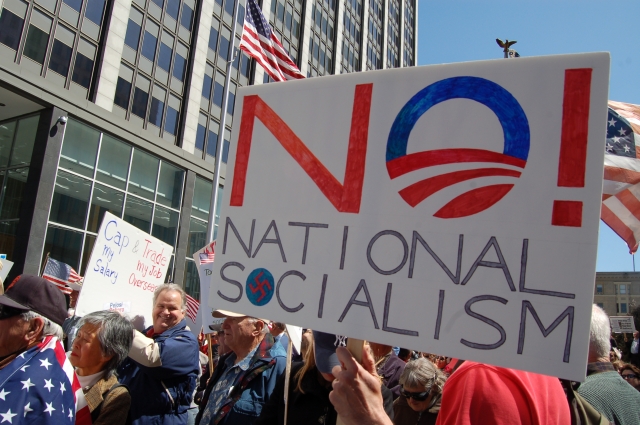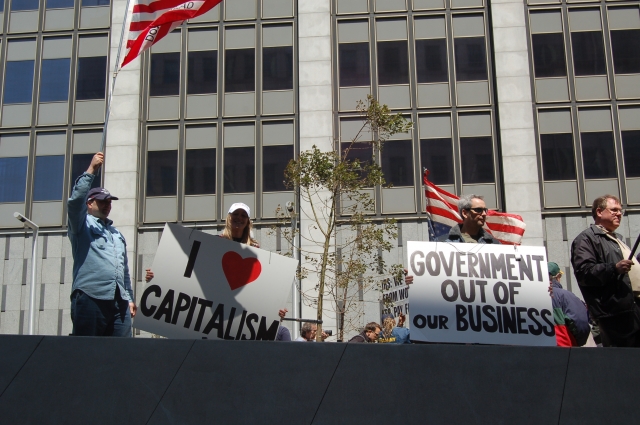From the Open-Publishing Calendar
From the Open-Publishing Newswire
Indybay Feature
I’m white and angry, tea party at SF Civic Center
On Wednesday, April the 15, hundreds of people converge at SF Civic Center to protest everything that is not nationalist, patriot, or heterosexual. Did you know that Obama is a traitor, that America has become “socialist”?
This protest concentrated on the Obama tax and bailout programs. I’m no fan of the Democrats, but didn’t Bush do the same things? What about billions of dollars to support an illegal war and occupation?
whatever.
i did not feel like writing some kind of an article or an analysis of the views that were presented. whats the point? the signs speak for themselves and present the ignorance that unite all the Tea Party protesters.
This protest concentrated on the Obama tax and bailout programs. I’m no fan of the Democrats, but didn’t Bush do the same things? What about billions of dollars to support an illegal war and occupation?
whatever.
i did not feel like writing some kind of an article or an analysis of the views that were presented. whats the point? the signs speak for themselves and present the ignorance that unite all the Tea Party protesters.
Add Your Comments
Comments
(Hide Comments)
It is scary that they right and extremists can still moblize in force like they did today around the country.
they oughta oppose the war.
At least one of these people wants free enterprise ... in slaves.
I love those Ayn Rand cultists. Do those maroons realize that Alan Greenspan was both in her inner-circle of followers, and was halfway responsible for triggering the credit bubble by manipulating interest rates in 2002-2005 during a brief downturn. He even admits that he was wrong now.
Moreover, how can Randites and philosophical capitalists support the idea of a central bank that drives the economy, controls unemployment rates and interest rates etc? Oh yeah, because they're a bunch of hypocrites. What we see right now is precisely how banks and capitalists have an incentive to behave. We are no more likely to see the fictitious pure capitalism than we are to see real communism (where everyone whistles while they work, without a strong security state). Banks and wealthy people have no incentive to not twist the rules to consolidate power, cheat, collude to pay labor less than they bargained for in order to increase profit
Since an 'objectivist' system requires a really large army and security apparatus, how do they propose to pay for it?
Moreover, how can Randites and philosophical capitalists support the idea of a central bank that drives the economy, controls unemployment rates and interest rates etc? Oh yeah, because they're a bunch of hypocrites. What we see right now is precisely how banks and capitalists have an incentive to behave. We are no more likely to see the fictitious pure capitalism than we are to see real communism (where everyone whistles while they work, without a strong security state). Banks and wealthy people have no incentive to not twist the rules to consolidate power, cheat, collude to pay labor less than they bargained for in order to increase profit
Since an 'objectivist' system requires a really large army and security apparatus, how do they propose to pay for it?
For those who live in the fantasy world that fascism cannot happen here:
We recognize that the politics of the leadership and corporate funders of the Democrat and Republican Parties are the same, but the voting base is very different. The Republican Party is clearly the American Nazi Party when it comes to voters. And here are the numbers:
1. San Franciscans who voted for Republican Pres Candidate McCain: 52,292 voters (13%)
2. Californians who voted for Republican Pres Candidate McCain: 4,902,000 voters (37%)
3. Americans who voted for Republican Pres Candidate McCain: 58,240,949 voters (48%)
I am proud to have been one of the 152,154 voters nationwide for Cynthia McKinney, the Green Party presidential candidate who is a supporter of the 9/11 Truth Movement, for peace, against the death penalty, for a $25 hour minimum wage, for single payer healthcare, supports the Palestinian liberation struggle, supports gay marriage, and much more.
The other peace candidate, Ralph Nader, got 697,236 votes nationwide. He is not a supporter of the 9/11 Truth Movement, a primary litmus test for worthwhile candidates. He is 75 years old and this was probably his last run.
About 131 million people voted in November 2008, 60% of the adult population of the US, an increase from the usual 50% of the adult population in previous years. That means again most of the workingclass did not vote at all. Of course, voting only reflects the class struggle that has preceded election day. We need far more class struggle to get rid of a private profit system that allows fascists such as those pictured above to organize and prosper.
The fascists are organizing in these bad economic times that are sure to get worse as millionaire, warmonger, death penalty promoter Democrat Obama has nothing to offer the workingclass. The rich are organized, as the pictures show. The fascists are also organizing the hoodlum sector of the workingclass. See:
http://www.democracynow.org/2009/4/16/headlines#12
and it is reprinted here:
"A new report says the number of violent hate groups in the US has increased more than 34 percent since 2000. According to the Southern Poverty Law Center, 926 groups were active last year, up from 602 nine years ago. The report comes on the heels of a warning from the Department of Homeland Security that right-wing extremist groups are gaining new recruits by exploiting fears about the economy and the election of the nation’s first black president."
Here is the full article from the Southern Poverty Law Center:
http://www.splcenter.org/news/item.jsp?aid=373
We recognize that the politics of the leadership and corporate funders of the Democrat and Republican Parties are the same, but the voting base is very different. The Republican Party is clearly the American Nazi Party when it comes to voters. And here are the numbers:
1. San Franciscans who voted for Republican Pres Candidate McCain: 52,292 voters (13%)
2. Californians who voted for Republican Pres Candidate McCain: 4,902,000 voters (37%)
3. Americans who voted for Republican Pres Candidate McCain: 58,240,949 voters (48%)
I am proud to have been one of the 152,154 voters nationwide for Cynthia McKinney, the Green Party presidential candidate who is a supporter of the 9/11 Truth Movement, for peace, against the death penalty, for a $25 hour minimum wage, for single payer healthcare, supports the Palestinian liberation struggle, supports gay marriage, and much more.
The other peace candidate, Ralph Nader, got 697,236 votes nationwide. He is not a supporter of the 9/11 Truth Movement, a primary litmus test for worthwhile candidates. He is 75 years old and this was probably his last run.
About 131 million people voted in November 2008, 60% of the adult population of the US, an increase from the usual 50% of the adult population in previous years. That means again most of the workingclass did not vote at all. Of course, voting only reflects the class struggle that has preceded election day. We need far more class struggle to get rid of a private profit system that allows fascists such as those pictured above to organize and prosper.
The fascists are organizing in these bad economic times that are sure to get worse as millionaire, warmonger, death penalty promoter Democrat Obama has nothing to offer the workingclass. The rich are organized, as the pictures show. The fascists are also organizing the hoodlum sector of the workingclass. See:
http://www.democracynow.org/2009/4/16/headlines#12
and it is reprinted here:
"A new report says the number of violent hate groups in the US has increased more than 34 percent since 2000. According to the Southern Poverty Law Center, 926 groups were active last year, up from 602 nine years ago. The report comes on the heels of a warning from the Department of Homeland Security that right-wing extremist groups are gaining new recruits by exploiting fears about the economy and the election of the nation’s first black president."
Here is the full article from the Southern Poverty Law Center:
http://www.splcenter.org/news/item.jsp?aid=373
...as evidenced by the signs disparaging SF's recently emasculated (thanks to governator-wannabe-Newsom) sanctuary ordinance.
The minuteklan seemed to be keeping things on the down-low, at least initially.
When I arrived on the scene around 11 a.m., I encountered about half a dozen other folks who were there prepared to counter-protest. Some of us left the scene for a time and returned at about noon, at which point the rally had gone off to the Federal Building and we encountered a few other confused would-be counter-protesters.
A friend of mine went down to civic center after I'd already left. The rally had reconvened there at this time. My friend says that a minuteklan contingent (possibly joined by others from the rally) shouted down a group of immigrants rights attorneys who were stagin an event on city hall steps. At this point, however, there were only three counter-protesters on the scene.
The minuteklan seemed to be keeping things on the down-low, at least initially.
When I arrived on the scene around 11 a.m., I encountered about half a dozen other folks who were there prepared to counter-protest. Some of us left the scene for a time and returned at about noon, at which point the rally had gone off to the Federal Building and we encountered a few other confused would-be counter-protesters.
A friend of mine went down to civic center after I'd already left. The rally had reconvened there at this time. My friend says that a minuteklan contingent (possibly joined by others from the rally) shouted down a group of immigrants rights attorneys who were stagin an event on city hall steps. At this point, however, there were only three counter-protesters on the scene.
Dum, Dums indeed! Repeal of the 14th Amendment would Eliminate Corporate Personhood!!! They'd really hate that. No more slavemaster... and what zombie can be without their slavemaster? Oh my god they would get to think for themselves.
btw - if anyone is interested there is a movement starting to create the 28th Amendment: Separation of Corporation and State. You can join a facebook group "One Million Strong for the Separation of Corporation and State". More info at http://www.ultimatecivics.com. The group was started by Dr. Riki Ott, a fisherwoman and toxicologist who worked on the Exxon Valdez case and was interviewed recently on DemocracyNow! and mentioned this initiative.
btw - if anyone is interested there is a movement starting to create the 28th Amendment: Separation of Corporation and State. You can join a facebook group "One Million Strong for the Separation of Corporation and State". More info at http://www.ultimatecivics.com. The group was started by Dr. Riki Ott, a fisherwoman and toxicologist who worked on the Exxon Valdez case and was interviewed recently on DemocracyNow! and mentioned this initiative.
For more information:
http://www.bluejayway.net/blog.html
Here is the 14th Amendment, to the US Constitution:
Section 1. All persons born or naturalized in the United States, and subject to the jurisdiction thereof, are citizens of the United States and of the State wherein they reside. No state shall make or enforce any law which shall abridge the privileges or immunities of citizens of the United States; nor shall any State deprive any person of life, liberty, or property, without due process of law; nor deny to any person within its jurisdiction the equal protection of the laws.
Section 2. Representatives shall be apportioned among the several States according to their respective numbers, counting the whole number of persons in each State, excluding Indians not taxed. But when the right to vote at any election for the choice of electors for President and Vice President of the United States, Representatives in Congress, the Executive and Judicial officers of a State, or the members of the Legislature thereof, is denied to any of the male inhabitants of such State, being twenty-one years of age, and citizens of the United States, or in any way abridged, except for participation in rebellion, or other crime, the basis of representation therein shall be reduced in the proportion which the number of such male citizens shall bear to the whole number of male citizens twenty-one years of age in such State.
Section 3. No person shall be a Senator or Representative in Congress, or elector of President and Vice President, or hold any office, civil or military, under the United States, or under any State, who, having previously taken an oath, as a member of Congress, or as an officer of the United States, or as a member of any State legislature, or as an executive or judicial officer of any State, to support the Constitution of the United States, shall have engaged in insurrection or rebellion against the same, or given aid or comfort to the enemies thereof. But Congress may by a vote of two-thirds of each House, remove such disability.
Section 4. The validity of the public debt of the United States, authorized by law, including debts incurred for payment of pensions and bounties for services in suppressing insurrection or rebellion, shall not be questioned. But neither the United States nor any State shall assume or pay any debt or obligation incurred in aid of insurrection or rebellion against the United States, or any claim for the loss or emancipation of any slave; but all such debts, obligations and claims shall be held illegal and void.
Section 5. The Congress shall have power to enforce, by appropriate legislation, the provisions of this article.[1]
The 13th, 14th and 15th Amendments are the Reconstruction Amendments passed between 1865 and 1870 The Fourteenth Amendment (proposed in 1866 and ratified in 1868) included the Privileges or Immunities Clause, Due Process and Equal Protection Clauses.
Here is more on the 14th Amendment from Wikipedia at:
http://en.wikipedia.org/wiki/Fourteenth_Amendment_to_the_United_States_Constitution
The Fourteenth Amendment (Amendment XIV) to the United States Constitution was one of the amendments enacted after the Civil War. This amendment was one of the Reconstruction Amendments, along with the Thirteenth and Fifteenth Amendments.
The amendment provides a broad definition of citizenship, overruling Dred Scott v. Sandford (1857) which had excluded slaves and their descendants from possessing Constitutional rights. The amendment requires states to provide equal protection under the law to all people within their jurisdictions and was used in the mid-20th century to dismantle racial segregation in the United States, as in Brown v. Board of Education (1954). Its Due Process Clause has been used to apply most of the Bill of Rights to the states. This clause has also been used to create: (1) substantive due process rights, such as parental and marriage rights; and (2) procedural due process rights requiring that certain steps, such as a hearing, be followed before a person's property interest can be taken away. The amendment also includes a number of clauses dealing with former slaves and Confederate states, but these clauses are either little-used or have been supplanted by subsequent changes in the law.
Background
Section 1 of the Fourteenth Amendment formally defines citizenship and protects people's civil and political rights from infringement by any state. This represented the Congress' reversal of that portion of the Dred Scott decision which ruled that blacks were not and could not become citizens of the United States or enjoy any of the privileges and immunities of citizenship.[2] The Civil Rights Act of 1866 had already granted U.S. citizenship to all people born in the United States; the framers of the Fourteenth Amendment added this principle into the Constitution to keep the Supreme Court from ruling the Civil Rights Act of 1866 to be unconstitutional for want of Congressional authority to pass such a law or a future Congress from altering it by a bare majority vote.
This section was also in response to the Black Codes which southern states had passed in the wake of the Thirteenth Amendment, which ended slavery in the United States.[3] Those laws attempted to return freed slaves to something like their former condition by, among other things, restricting their movement and by preventing them from suing or testifying in court.
Section 1 also includes a formal definition of citizenship. During the original debate over the amendment, Senator Jacob M. Howard of Michigan—the author of the citizenship clause—described the clause as excluding not only "Indians", but also “persons born in the United States who are foreigners, aliens, who belong to the families of ambassadors or foreign ministers.”[4] Howard also stated the word "jurisdiction" meant the United States possessed a “full and complete jurisdiction” over the person described in the amendment.[5] Such meaning precluded citizenship to any person who was beholden, in even the slightest respect, to any sovereignty other than a U.S. state or the federal government.[5][6]
Finally, this section was in response to violence against African Americans within the southern states. A Joint Committee on Reconstruction found that only a Constitutional amendment could protect the rights and safety of African Americans within those states.[7]
[edit] Citizenship Clause
Main article: Citizenship Clause
In Elk v. Wilkins, 112 U.S. 94 (1884), the clause's meaning was tested regarding whether it meant that anyone born in the United States would be a citizen regardless of the parents' nationality. In that case, the Supreme Court held that the children of Native Americans were not citizens, despite the fact that they were born in the United States.
The meaning was tested again in the case of United States v. Wong Kim Ark, 169 U.S. 649 (1898), regarding children of non-citizen Chinese immigrants born in United States. The court ruled that the children were U.S. citizens.[8]
The distinction between "legal" and "illegal" immigrants was not clear at the time of the decision of Wong Kim Ark.[9] Neither in that decision nor in any subsequent case has the Supreme Court explicitly ruled on whether children born in the United States to illegal immigrant parents are entitled to birthright citizenship via the amendment,[10] although that has generally been assumed to be the case.[11] In some cases, the Court has implicitly assumed, or suggested in dicta, that such children are entitled to birthright citizenship: these include INS v. Rios-Pineda, 471 U.S. 444 (1985)[12] and Plyler v. Doe, 457 U.S. 202 (1982).[13] Nevertheless, some claim the Congress possesses the power to exclude such children from US citizenship by legislation.[10]
The Constitution does not explicitly provide any procedure for loss of United States citizenship. Loss of U.S. citizenship is possible only under the following circumstances:
Fraud in the naturalization process. Technically, this is not loss of citizenship but rather a voiding of the purported naturalization and a declaration that the immigrant never was a U.S. citizen.
Voluntary relinquishment of citizenship. This may be accomplished either through renunciation procedures specially established by the State Department or through other actions which demonstrate an intent to give up U.S. citizenship.[14]
For a long time, voluntary acquisition or exercise of a foreign citizenship was considered sufficient cause for revocation of U.S. citizenship.[15] This concept was enshrined in a series of treaties between the United States and other countries (the Bancroft Treaties). However, the Supreme Court repudiated this concept in Afroyim v. Rusk, 387 U.S. 253 (1967), as well as Vance v. Terrazas, 444 U.S. 252 (1980), holding that the Citizenship Clause of the Fourteenth Amendment barred the Congress from revoking citizenship.
[edit] Due Process Clause
Main article: Due process
Beginning in the 1880s, the Court interpreted the Fourteenth Amendment's Due Process Clause as providing substantive protection to private contracts and thus prohibiting a range of social and economic regulation. The Court held that the Fourteenth Amendment protected "freedom of contract" or the right of employees and employers to bargain for wages without great interference from the state. Thus, the Court struck down a law decreeing maximum hours for workers in a bakery in Lochner v. New York (1905) and struck down a minimum wage law in Adkins v. Children's Hospital (1923). The Court did uphold some economic regulation, however, including state prohibition laws (Mugler v. Kansas), laws declaring maximum hours for mine workers (Holden v. Hardy (1898)), laws declaring maximum hours for female workers (Muller v. Oregon (1908)), President Wilson's intervention in a railroad strike (Wilson v. New (1917)), as well as federal laws regulating narcotics (United States v. Doremus (1919)).
The Court overruled Lochner, Adkins and other precedents protecting "liberty of contract" in West Coast Hotel v. Parrish (1937), decided in the midst of the New Deal and in the shadow of President Franklin D. Roosevelt's threats to "pack the court" following a series of decisions holding other New Deal legislation unconstitutional. In the past forty years it has recognized a number of "fundamental rights" of individuals, such as privacy and some parental rights, which the states can regulate only under narrowly defined circumstances. The Court has also greatly expanded the reach of procedural due process, requiring some sort of hearing before the government may terminate civil service employees, expel a student from public school, or cut off a welfare recipient's benefits.[16][17]
[edit] Equal Protection Clause
Main article: Equal Protection Clause
In the decades following the adoption of the Fourteenth Amendment, the Supreme Court overturned laws barring blacks from juries (Strauder v. West Virginia (1880)) or discriminating against Chinese-Americans in the regulation of laundry businesses (Yick Wo v. Hopkins (1886)), as violations of the Equal Protection Clause. However, in Plessy v. Ferguson (1896), the Supreme Court held that the states could impose segregation so long as they provided equivalent facilities—the genesis of the "separate but equal" doctrine.[18] The Court went even further in restricting the Equal Protection Clause in Berea College v. Kentucky (1908), holding that the states could force private actors to discriminate by prohibiting an integrated college from admitting both black and white students. By the early twentieth century, the Equal Protection Clause had been eclipsed to the point that Justice Oliver Wendell Holmes, Jr. dismissed it as "the usual last resort of constitutional arguments."[19]
The Court held to the "separate but equal" doctrine for more than fifty years, despite numerous cases in which the Court itself had found that the segregated facilities provided by the states were almost never equal, until Brown v. Board of Education (1954) reached the Court. Brown met with a campaign of resistance from white Southerners, and for decades the federal courts attempted to enforce Brown's mandate against continual attempts at circumvention.[20] This resulted in the controversial desegregation busing decrees handed down by federal courts in many parts of the nation, including major Northern cities such as Detroit (Milliken v. Bradley (1974)) and Boston. In Hernandez v. Texas,[21] the Court held that the Fourteenth Amendment protects those beyond the racial classes of white or "Negro," and extends to other racial and nationalistic groups, such as the Mexican-American in this case. In the half century since Brown, the Court has extended the reach of the Equal Protection Clause to other historically disadvantaged groups, such as women and illegitimate children, although it has applied a somewhat less stringent test than it has applied to governmental discrimination on the basis of race (United States v. Virginia (1996); Levy v. Louisiana (1968)).[22]
Though the framers of the Fourteenth Amendment did not believe it would expand voting rights[23] (leading to the passage of the Fifteenth Amendment), the Supreme Court, since Baker v. Carr (1962) and Reynolds v. Sims (1964), has also interpreted the Equal Protection Clause as requiring the states to apportion their congressional districts and state legislative seats on a "one-person, one-vote" basis. The Court has also struck down districting plans in which race was a major consideration. In Shaw v. Reno (1993), the Court prohibited a North Carolina plan aimed at creating majority-black districts to balance historic underrepresentation in the state's Congressional delegations.[24] In League of United Latin American Citizens v. Perry (2006), the Court ruled that Tom DeLay's Texas redistricting plan intentionally diluted the votes of Latinos and thus violated the Equal Protection Clause. In both of those cases, however, the Court refused to interfere with partisan gerrymandering as opposed to racial or ethnic gerrymandering, seeing it as within the valid scope of state authority.
[edit] Incorporation
Main articles: Incorporation (Bill of Rights) and Privileges or Immunities Clause
Prior to the adoption of this amendment, the Bill of Rights had been held by the Supreme Court to not apply to the states.[25] While many states modeled their constitutions and laws after the United States Constitution and federal laws, those state constitutions did not necessarily include provisions comparable to the Bill of Rights. According to some commentators, the framers and early supporters of the Fourteenth Amendment believed that it would ensure that the states would be required to recognize the individual rights the federal government was already required to respect in the Bill of Rights and in other constitutional provisions; all of these rights were likely understood to fall within the "privileges or immunities" safeguarded by the Amendment.[26] However, the Supreme Court limited the reach of the Amendment by holding in the Slaughterhouse Cases (1873) that the Privileges or Immunities Clause was limited to "privileges or immunities" granted to citizens by the federal government in virtue of national citizenship. The Court further held in the Civil Rights Cases (1883) that the Amendment was limited to "state action" and thus did not authorize the Congress to outlaw racial discrimination on the part of private individuals or organizations. Neither of these decisions has been overturned and in fact have been specifically reaffirmed several times.[27]
However, by the latter half of the twentieth century, nearly all of the rights in the Bill of Rights had been applied to the states, under what is known as the incorporation doctrine. As a result, the Fourteenth Amendment not only empowered the federal courts to intervene in this area to enforce the guarantee of the Due Process and Equal Protection Clauses, but also to import the substantive rights of free speech, freedom of religion, protection from unreasonable searches and cruel and unusual punishment, and other limitations on governmental power.[28] At the present, the Supreme Court has held that the Due Process Clause incorporates all of the substantive protections of the First, Fourth, Sixth, and Eighth Amendments and all of the Fifth Amendment other than the requirement that any criminal prosecution must follow a grand jury indictment, but none of the provisions of the Seventh Amendment relating to civil trials.[28]
[edit] Apportionment of Representatives
Section 2 of the Fourteenth Amendment establishes rules for the apportioning of Representatives in the Congress to states, essentially counting all residents for apportionment and reducing apportionment if a state wrongfully denies a person's right to vote. This section overrode the provisions of Article I, Section 2, Clause 3 of the Constitution, which counted slaves as three-fifths of a person for purposes of allotting seats in the House of Representatives and the Electoral College.
However, the provision calling for proportional decreases in representation in the House of Representatives for states that denied men 21 and older the right to vote was never enforced, despite the fact that Southern states prevented many blacks from voting before the passage of the Voting Rights Act in 1965.[29] Some have argued that Section 2 was implicitly repealed by the Fifteenth Amendment,[30] but it should be noted that the Supreme Court has acknowledged the provisions of Section 2 in modern times. For example, in Richardson v. Ramirez, 418 U.S. 24 (1974) the Court invoked Section 2 to justify the disenfranchisement of felons by the states. In his dissent, Justice Marshall explained the history of the Section 2 in relation to the Post-Civil War Reconstruction era:
The historical purpose for section 2 itself is, however, relatively clear and, in my view, dispositive of this case. The Republicans who controlled the 39th Congress were concerned that the additional congressional representation of the Southern States which would result from the abolition of slavery might weaken their own political dominance. There were two alternatives available—either to limit southern representation, which was unacceptable on a long-term basis, or to insure that southern Negroes, sympathetic to the Republican cause, would be enfranchised; but an explicit grant of suffrage to Negroes was thought politically unpalatable at the time. Section 2 of the Fourteenth Amendment was the resultant compromise. It put Southern States to a choice—enfranchise Negro voters or lose congressional representation. [...] Section 2 provides a special remedy—reduced representation—to cure a particular form of electoral abuse—the disenfranchisement of Negroes.[31]
[edit] Participants in rebellion
Section 3 prevents the election or appointment to any federal or State office of any person who had held any of certain offices and then engaged in insurrection, rebellion or treason. However, a two-thirds vote by each House of the Congress can override this limitation. In 1975, Robert E. Lee's citizenship was restored by a joint Congressional resolution, retroactive to June 13, 1865.[32] In 1978, two-thirds of both Houses of Congress voted to posthumously remove the service ban from Jefferson Davis.[33]
[edit] Validity of public debt
Section 4 confirmed the legitimacy of all United States public debt legislated by the Congress. It also confirmed that neither the United States nor any state would pay damages for the loss of slaves or debts that had been incurred by the Confederacy. For example, several English and French banks had loaned money to the South during the war.THIS WAS REVOLUTIONARY: THE SLAVEOCRACY HAD ITS LABOR FORCE TAKEN FROM IT WITH NO COMPENSATION, AND THAT IS WHAT THEY DESERVED.
Federal troops should have stayed in the South after 1877, the date of the Great Betrayal, when federal troops were removed, also known as the Hayes-Tilden Compromise. See
http://en.wikipedia.org/wiki/Compromise_of_1877
The result of the removal of federal troops from the South was the re-enslavement of African-Americans in the South with the convict lease system, described in depth with outstanding writing by Douglas Blackmon in his bestseller: SLAVERY BY ANOTHER NAME: THE REINSLAVEMENT OF BLACK AMERICANS FROM THE CIVIL WAR TO WORLD WAR 2 (2008: Anchor Books). I thought I had read it all and would be wasting my time reading another book on the horrors of American history, but I am glad to say I was not only wrong, but enjoyed an enriching experience with the amazingly good writing of Douglas Blackmon. His quotes from and tributes to Dr. W.E.B. Dubois are much appreciated and on point. The obvious comparison of the convict lease system, neoslavery, that oppressed thousands of blacks in the South to today's prrofitable prison system and the continued existence of the death penalty is immediately made by any politically conscious reader.
For those of us who remember the civil rights struggles of the 1960s, it is very clear that the hard-fought for freedoms won, based on the 13th, 14th and 15th Amendments, have only since the 1960s made possible the integration and acceptance of blacks as equals to all . This writer can easily remember when blacks were considered second class citizens by most whites, discrimination was rampant in all organizations including labor unions, bar associations (attorney's organizations), schools, housing, healthcare, and everything else, right through the 1960s. Things are not good today; but they were far worse before the 1960s. It was simply unthinkable to see blacks in ads, in the movies and in most decent-paying jobs before the 1960s.
This whining about corporate personhood is contrived. The issue is the capitalist profit motive, wihch can only be eliminated by a serious labor movement. The corporations are simply a means by which the capitalist class maximizes its profits, the primary goal of capitalism. To finish the revolution begun by the Civil War, we need a labor movement that can put an end to capitalism. We say: Black, brown, yellow, red and white; same enemy, same fight; Workers of the World, Unite!
Section 1. All persons born or naturalized in the United States, and subject to the jurisdiction thereof, are citizens of the United States and of the State wherein they reside. No state shall make or enforce any law which shall abridge the privileges or immunities of citizens of the United States; nor shall any State deprive any person of life, liberty, or property, without due process of law; nor deny to any person within its jurisdiction the equal protection of the laws.
Section 2. Representatives shall be apportioned among the several States according to their respective numbers, counting the whole number of persons in each State, excluding Indians not taxed. But when the right to vote at any election for the choice of electors for President and Vice President of the United States, Representatives in Congress, the Executive and Judicial officers of a State, or the members of the Legislature thereof, is denied to any of the male inhabitants of such State, being twenty-one years of age, and citizens of the United States, or in any way abridged, except for participation in rebellion, or other crime, the basis of representation therein shall be reduced in the proportion which the number of such male citizens shall bear to the whole number of male citizens twenty-one years of age in such State.
Section 3. No person shall be a Senator or Representative in Congress, or elector of President and Vice President, or hold any office, civil or military, under the United States, or under any State, who, having previously taken an oath, as a member of Congress, or as an officer of the United States, or as a member of any State legislature, or as an executive or judicial officer of any State, to support the Constitution of the United States, shall have engaged in insurrection or rebellion against the same, or given aid or comfort to the enemies thereof. But Congress may by a vote of two-thirds of each House, remove such disability.
Section 4. The validity of the public debt of the United States, authorized by law, including debts incurred for payment of pensions and bounties for services in suppressing insurrection or rebellion, shall not be questioned. But neither the United States nor any State shall assume or pay any debt or obligation incurred in aid of insurrection or rebellion against the United States, or any claim for the loss or emancipation of any slave; but all such debts, obligations and claims shall be held illegal and void.
Section 5. The Congress shall have power to enforce, by appropriate legislation, the provisions of this article.[1]
The 13th, 14th and 15th Amendments are the Reconstruction Amendments passed between 1865 and 1870 The Fourteenth Amendment (proposed in 1866 and ratified in 1868) included the Privileges or Immunities Clause, Due Process and Equal Protection Clauses.
Here is more on the 14th Amendment from Wikipedia at:
http://en.wikipedia.org/wiki/Fourteenth_Amendment_to_the_United_States_Constitution
The Fourteenth Amendment (Amendment XIV) to the United States Constitution was one of the amendments enacted after the Civil War. This amendment was one of the Reconstruction Amendments, along with the Thirteenth and Fifteenth Amendments.
The amendment provides a broad definition of citizenship, overruling Dred Scott v. Sandford (1857) which had excluded slaves and their descendants from possessing Constitutional rights. The amendment requires states to provide equal protection under the law to all people within their jurisdictions and was used in the mid-20th century to dismantle racial segregation in the United States, as in Brown v. Board of Education (1954). Its Due Process Clause has been used to apply most of the Bill of Rights to the states. This clause has also been used to create: (1) substantive due process rights, such as parental and marriage rights; and (2) procedural due process rights requiring that certain steps, such as a hearing, be followed before a person's property interest can be taken away. The amendment also includes a number of clauses dealing with former slaves and Confederate states, but these clauses are either little-used or have been supplanted by subsequent changes in the law.
Background
Section 1 of the Fourteenth Amendment formally defines citizenship and protects people's civil and political rights from infringement by any state. This represented the Congress' reversal of that portion of the Dred Scott decision which ruled that blacks were not and could not become citizens of the United States or enjoy any of the privileges and immunities of citizenship.[2] The Civil Rights Act of 1866 had already granted U.S. citizenship to all people born in the United States; the framers of the Fourteenth Amendment added this principle into the Constitution to keep the Supreme Court from ruling the Civil Rights Act of 1866 to be unconstitutional for want of Congressional authority to pass such a law or a future Congress from altering it by a bare majority vote.
This section was also in response to the Black Codes which southern states had passed in the wake of the Thirteenth Amendment, which ended slavery in the United States.[3] Those laws attempted to return freed slaves to something like their former condition by, among other things, restricting their movement and by preventing them from suing or testifying in court.
Section 1 also includes a formal definition of citizenship. During the original debate over the amendment, Senator Jacob M. Howard of Michigan—the author of the citizenship clause—described the clause as excluding not only "Indians", but also “persons born in the United States who are foreigners, aliens, who belong to the families of ambassadors or foreign ministers.”[4] Howard also stated the word "jurisdiction" meant the United States possessed a “full and complete jurisdiction” over the person described in the amendment.[5] Such meaning precluded citizenship to any person who was beholden, in even the slightest respect, to any sovereignty other than a U.S. state or the federal government.[5][6]
Finally, this section was in response to violence against African Americans within the southern states. A Joint Committee on Reconstruction found that only a Constitutional amendment could protect the rights and safety of African Americans within those states.[7]
[edit] Citizenship Clause
Main article: Citizenship Clause
In Elk v. Wilkins, 112 U.S. 94 (1884), the clause's meaning was tested regarding whether it meant that anyone born in the United States would be a citizen regardless of the parents' nationality. In that case, the Supreme Court held that the children of Native Americans were not citizens, despite the fact that they were born in the United States.
The meaning was tested again in the case of United States v. Wong Kim Ark, 169 U.S. 649 (1898), regarding children of non-citizen Chinese immigrants born in United States. The court ruled that the children were U.S. citizens.[8]
The distinction between "legal" and "illegal" immigrants was not clear at the time of the decision of Wong Kim Ark.[9] Neither in that decision nor in any subsequent case has the Supreme Court explicitly ruled on whether children born in the United States to illegal immigrant parents are entitled to birthright citizenship via the amendment,[10] although that has generally been assumed to be the case.[11] In some cases, the Court has implicitly assumed, or suggested in dicta, that such children are entitled to birthright citizenship: these include INS v. Rios-Pineda, 471 U.S. 444 (1985)[12] and Plyler v. Doe, 457 U.S. 202 (1982).[13] Nevertheless, some claim the Congress possesses the power to exclude such children from US citizenship by legislation.[10]
The Constitution does not explicitly provide any procedure for loss of United States citizenship. Loss of U.S. citizenship is possible only under the following circumstances:
Fraud in the naturalization process. Technically, this is not loss of citizenship but rather a voiding of the purported naturalization and a declaration that the immigrant never was a U.S. citizen.
Voluntary relinquishment of citizenship. This may be accomplished either through renunciation procedures specially established by the State Department or through other actions which demonstrate an intent to give up U.S. citizenship.[14]
For a long time, voluntary acquisition or exercise of a foreign citizenship was considered sufficient cause for revocation of U.S. citizenship.[15] This concept was enshrined in a series of treaties between the United States and other countries (the Bancroft Treaties). However, the Supreme Court repudiated this concept in Afroyim v. Rusk, 387 U.S. 253 (1967), as well as Vance v. Terrazas, 444 U.S. 252 (1980), holding that the Citizenship Clause of the Fourteenth Amendment barred the Congress from revoking citizenship.
[edit] Due Process Clause
Main article: Due process
Beginning in the 1880s, the Court interpreted the Fourteenth Amendment's Due Process Clause as providing substantive protection to private contracts and thus prohibiting a range of social and economic regulation. The Court held that the Fourteenth Amendment protected "freedom of contract" or the right of employees and employers to bargain for wages without great interference from the state. Thus, the Court struck down a law decreeing maximum hours for workers in a bakery in Lochner v. New York (1905) and struck down a minimum wage law in Adkins v. Children's Hospital (1923). The Court did uphold some economic regulation, however, including state prohibition laws (Mugler v. Kansas), laws declaring maximum hours for mine workers (Holden v. Hardy (1898)), laws declaring maximum hours for female workers (Muller v. Oregon (1908)), President Wilson's intervention in a railroad strike (Wilson v. New (1917)), as well as federal laws regulating narcotics (United States v. Doremus (1919)).
The Court overruled Lochner, Adkins and other precedents protecting "liberty of contract" in West Coast Hotel v. Parrish (1937), decided in the midst of the New Deal and in the shadow of President Franklin D. Roosevelt's threats to "pack the court" following a series of decisions holding other New Deal legislation unconstitutional. In the past forty years it has recognized a number of "fundamental rights" of individuals, such as privacy and some parental rights, which the states can regulate only under narrowly defined circumstances. The Court has also greatly expanded the reach of procedural due process, requiring some sort of hearing before the government may terminate civil service employees, expel a student from public school, or cut off a welfare recipient's benefits.[16][17]
[edit] Equal Protection Clause
Main article: Equal Protection Clause
In the decades following the adoption of the Fourteenth Amendment, the Supreme Court overturned laws barring blacks from juries (Strauder v. West Virginia (1880)) or discriminating against Chinese-Americans in the regulation of laundry businesses (Yick Wo v. Hopkins (1886)), as violations of the Equal Protection Clause. However, in Plessy v. Ferguson (1896), the Supreme Court held that the states could impose segregation so long as they provided equivalent facilities—the genesis of the "separate but equal" doctrine.[18] The Court went even further in restricting the Equal Protection Clause in Berea College v. Kentucky (1908), holding that the states could force private actors to discriminate by prohibiting an integrated college from admitting both black and white students. By the early twentieth century, the Equal Protection Clause had been eclipsed to the point that Justice Oliver Wendell Holmes, Jr. dismissed it as "the usual last resort of constitutional arguments."[19]
The Court held to the "separate but equal" doctrine for more than fifty years, despite numerous cases in which the Court itself had found that the segregated facilities provided by the states were almost never equal, until Brown v. Board of Education (1954) reached the Court. Brown met with a campaign of resistance from white Southerners, and for decades the federal courts attempted to enforce Brown's mandate against continual attempts at circumvention.[20] This resulted in the controversial desegregation busing decrees handed down by federal courts in many parts of the nation, including major Northern cities such as Detroit (Milliken v. Bradley (1974)) and Boston. In Hernandez v. Texas,[21] the Court held that the Fourteenth Amendment protects those beyond the racial classes of white or "Negro," and extends to other racial and nationalistic groups, such as the Mexican-American in this case. In the half century since Brown, the Court has extended the reach of the Equal Protection Clause to other historically disadvantaged groups, such as women and illegitimate children, although it has applied a somewhat less stringent test than it has applied to governmental discrimination on the basis of race (United States v. Virginia (1996); Levy v. Louisiana (1968)).[22]
Though the framers of the Fourteenth Amendment did not believe it would expand voting rights[23] (leading to the passage of the Fifteenth Amendment), the Supreme Court, since Baker v. Carr (1962) and Reynolds v. Sims (1964), has also interpreted the Equal Protection Clause as requiring the states to apportion their congressional districts and state legislative seats on a "one-person, one-vote" basis. The Court has also struck down districting plans in which race was a major consideration. In Shaw v. Reno (1993), the Court prohibited a North Carolina plan aimed at creating majority-black districts to balance historic underrepresentation in the state's Congressional delegations.[24] In League of United Latin American Citizens v. Perry (2006), the Court ruled that Tom DeLay's Texas redistricting plan intentionally diluted the votes of Latinos and thus violated the Equal Protection Clause. In both of those cases, however, the Court refused to interfere with partisan gerrymandering as opposed to racial or ethnic gerrymandering, seeing it as within the valid scope of state authority.
[edit] Incorporation
Main articles: Incorporation (Bill of Rights) and Privileges or Immunities Clause
Prior to the adoption of this amendment, the Bill of Rights had been held by the Supreme Court to not apply to the states.[25] While many states modeled their constitutions and laws after the United States Constitution and federal laws, those state constitutions did not necessarily include provisions comparable to the Bill of Rights. According to some commentators, the framers and early supporters of the Fourteenth Amendment believed that it would ensure that the states would be required to recognize the individual rights the federal government was already required to respect in the Bill of Rights and in other constitutional provisions; all of these rights were likely understood to fall within the "privileges or immunities" safeguarded by the Amendment.[26] However, the Supreme Court limited the reach of the Amendment by holding in the Slaughterhouse Cases (1873) that the Privileges or Immunities Clause was limited to "privileges or immunities" granted to citizens by the federal government in virtue of national citizenship. The Court further held in the Civil Rights Cases (1883) that the Amendment was limited to "state action" and thus did not authorize the Congress to outlaw racial discrimination on the part of private individuals or organizations. Neither of these decisions has been overturned and in fact have been specifically reaffirmed several times.[27]
However, by the latter half of the twentieth century, nearly all of the rights in the Bill of Rights had been applied to the states, under what is known as the incorporation doctrine. As a result, the Fourteenth Amendment not only empowered the federal courts to intervene in this area to enforce the guarantee of the Due Process and Equal Protection Clauses, but also to import the substantive rights of free speech, freedom of religion, protection from unreasonable searches and cruel and unusual punishment, and other limitations on governmental power.[28] At the present, the Supreme Court has held that the Due Process Clause incorporates all of the substantive protections of the First, Fourth, Sixth, and Eighth Amendments and all of the Fifth Amendment other than the requirement that any criminal prosecution must follow a grand jury indictment, but none of the provisions of the Seventh Amendment relating to civil trials.[28]
[edit] Apportionment of Representatives
Section 2 of the Fourteenth Amendment establishes rules for the apportioning of Representatives in the Congress to states, essentially counting all residents for apportionment and reducing apportionment if a state wrongfully denies a person's right to vote. This section overrode the provisions of Article I, Section 2, Clause 3 of the Constitution, which counted slaves as three-fifths of a person for purposes of allotting seats in the House of Representatives and the Electoral College.
However, the provision calling for proportional decreases in representation in the House of Representatives for states that denied men 21 and older the right to vote was never enforced, despite the fact that Southern states prevented many blacks from voting before the passage of the Voting Rights Act in 1965.[29] Some have argued that Section 2 was implicitly repealed by the Fifteenth Amendment,[30] but it should be noted that the Supreme Court has acknowledged the provisions of Section 2 in modern times. For example, in Richardson v. Ramirez, 418 U.S. 24 (1974) the Court invoked Section 2 to justify the disenfranchisement of felons by the states. In his dissent, Justice Marshall explained the history of the Section 2 in relation to the Post-Civil War Reconstruction era:
The historical purpose for section 2 itself is, however, relatively clear and, in my view, dispositive of this case. The Republicans who controlled the 39th Congress were concerned that the additional congressional representation of the Southern States which would result from the abolition of slavery might weaken their own political dominance. There were two alternatives available—either to limit southern representation, which was unacceptable on a long-term basis, or to insure that southern Negroes, sympathetic to the Republican cause, would be enfranchised; but an explicit grant of suffrage to Negroes was thought politically unpalatable at the time. Section 2 of the Fourteenth Amendment was the resultant compromise. It put Southern States to a choice—enfranchise Negro voters or lose congressional representation. [...] Section 2 provides a special remedy—reduced representation—to cure a particular form of electoral abuse—the disenfranchisement of Negroes.[31]
[edit] Participants in rebellion
Section 3 prevents the election or appointment to any federal or State office of any person who had held any of certain offices and then engaged in insurrection, rebellion or treason. However, a two-thirds vote by each House of the Congress can override this limitation. In 1975, Robert E. Lee's citizenship was restored by a joint Congressional resolution, retroactive to June 13, 1865.[32] In 1978, two-thirds of both Houses of Congress voted to posthumously remove the service ban from Jefferson Davis.[33]
[edit] Validity of public debt
Section 4 confirmed the legitimacy of all United States public debt legislated by the Congress. It also confirmed that neither the United States nor any state would pay damages for the loss of slaves or debts that had been incurred by the Confederacy. For example, several English and French banks had loaned money to the South during the war.THIS WAS REVOLUTIONARY: THE SLAVEOCRACY HAD ITS LABOR FORCE TAKEN FROM IT WITH NO COMPENSATION, AND THAT IS WHAT THEY DESERVED.
Federal troops should have stayed in the South after 1877, the date of the Great Betrayal, when federal troops were removed, also known as the Hayes-Tilden Compromise. See
http://en.wikipedia.org/wiki/Compromise_of_1877
The result of the removal of federal troops from the South was the re-enslavement of African-Americans in the South with the convict lease system, described in depth with outstanding writing by Douglas Blackmon in his bestseller: SLAVERY BY ANOTHER NAME: THE REINSLAVEMENT OF BLACK AMERICANS FROM THE CIVIL WAR TO WORLD WAR 2 (2008: Anchor Books). I thought I had read it all and would be wasting my time reading another book on the horrors of American history, but I am glad to say I was not only wrong, but enjoyed an enriching experience with the amazingly good writing of Douglas Blackmon. His quotes from and tributes to Dr. W.E.B. Dubois are much appreciated and on point. The obvious comparison of the convict lease system, neoslavery, that oppressed thousands of blacks in the South to today's prrofitable prison system and the continued existence of the death penalty is immediately made by any politically conscious reader.
For those of us who remember the civil rights struggles of the 1960s, it is very clear that the hard-fought for freedoms won, based on the 13th, 14th and 15th Amendments, have only since the 1960s made possible the integration and acceptance of blacks as equals to all . This writer can easily remember when blacks were considered second class citizens by most whites, discrimination was rampant in all organizations including labor unions, bar associations (attorney's organizations), schools, housing, healthcare, and everything else, right through the 1960s. Things are not good today; but they were far worse before the 1960s. It was simply unthinkable to see blacks in ads, in the movies and in most decent-paying jobs before the 1960s.
This whining about corporate personhood is contrived. The issue is the capitalist profit motive, wihch can only be eliminated by a serious labor movement. The corporations are simply a means by which the capitalist class maximizes its profits, the primary goal of capitalism. To finish the revolution begun by the Civil War, we need a labor movement that can put an end to capitalism. We say: Black, brown, yellow, red and white; same enemy, same fight; Workers of the World, Unite!
For more information:
http://en.wikipedia.org/wiki/Fourteenth_Am...
I would have thought a tea party in San Fran would never happen. Anyway, some of your comments have a few factual errors...
"It is scary that they right and extremists can still moblize in force like they did today around the country."
Did it ever occure to you that they think the same thing about you? All sides have the right to protest.
"they oughta oppose the war."
and military bases in over 130 countries. Some do. Ron Paul (R-Tx) voted against the Iraq war and has voted against every war funding bill. He is also opposed to world empire.
"I love those Ayn Rand cultists."
I'm sure they love you too.
"Do those maroons realize that Alan Greenspan was both in her inner-circle of followers, and was halfway responsible for triggering the credit bubble by manipulating interest rates in 2002-2005 during a brief downturn. He even admits that he was wrong now."
First off, Rand and Greenspan parted ways over 30 years ago. She is probably rolling in her grave at everything Greenspan has done. Secondly, Austrian school economists like Peter Schiff, Jim Rogers, and Marc Faber warned years ago that Greenspan and his interest rate manipulations were going to lead to disaster. So yes, anyone at the party who follows Austrian economics or is a member of the Campaign for Liberty knows full well who is to blame.
"Moreover, how can Randites and philosophical capitalists support the idea of a central bank that drives the economy, controls unemployment rates and interest rates etc?"
Simple. They don't. Rand was very against the central bank. Jim Rogers, when asked what 2 things he would do if he were appointed head of the Federal Reserve, said "I'd abolish the FED and resign." Ron Paul has called numerous times to abolish the FED and currently has a bill in congress to have the FED fully audited.
"Since an 'objectivist' system requires a really large army and security apparatus"
An objectivist system requires there be no army or security apparatus. It's all about individual freedom. You have it backwards.
Objectivists are idealists. So are communists. The ideal never comes to pass, but that never stopped anyone from believeing in it.
"It is scary that they right and extremists can still moblize in force like they did today around the country."
Did it ever occure to you that they think the same thing about you? All sides have the right to protest.
"they oughta oppose the war."
and military bases in over 130 countries. Some do. Ron Paul (R-Tx) voted against the Iraq war and has voted against every war funding bill. He is also opposed to world empire.
"I love those Ayn Rand cultists."
I'm sure they love you too.
"Do those maroons realize that Alan Greenspan was both in her inner-circle of followers, and was halfway responsible for triggering the credit bubble by manipulating interest rates in 2002-2005 during a brief downturn. He even admits that he was wrong now."
First off, Rand and Greenspan parted ways over 30 years ago. She is probably rolling in her grave at everything Greenspan has done. Secondly, Austrian school economists like Peter Schiff, Jim Rogers, and Marc Faber warned years ago that Greenspan and his interest rate manipulations were going to lead to disaster. So yes, anyone at the party who follows Austrian economics or is a member of the Campaign for Liberty knows full well who is to blame.
"Moreover, how can Randites and philosophical capitalists support the idea of a central bank that drives the economy, controls unemployment rates and interest rates etc?"
Simple. They don't. Rand was very against the central bank. Jim Rogers, when asked what 2 things he would do if he were appointed head of the Federal Reserve, said "I'd abolish the FED and resign." Ron Paul has called numerous times to abolish the FED and currently has a bill in congress to have the FED fully audited.
"Since an 'objectivist' system requires a really large army and security apparatus"
An objectivist system requires there be no army or security apparatus. It's all about individual freedom. You have it backwards.
Objectivists are idealists. So are communists. The ideal never comes to pass, but that never stopped anyone from believeing in it.
yea questioner, thats all well and fine that they may support some of the same shit as us. but what wasnt in the photos was when these racist fucks attacked my homie; the only black person there. physically attacked him, verbally attacked us vets calling us fake all whilst chanting USA USA at us, then sicked the police at us calling us the attackers and agent provocateurs. obviously, these people are fucking crazy. which is why we werent detained for too long. and their leader, ron paul, racist as well. militarization of the border= murdered migrants= racism. thats the real problem here. speak on that.
Did it really take an amendment that long to say: All persons, no matter, race, age, sex shall be viewed as equals in the eyes of the constitution? The 14th amendment is full of legal loop holes and creates a corporate entity out of your citizenship. It was never properly ratified. Http://www.dirtyunclesam.com Look at the actual congressional record proving that it is illegal and unconstitutional.
We are 100% volunteer and depend on your participation to sustain our efforts!
Get Involved
If you'd like to help with maintaining or developing the website, contact us.
Publish
Publish your stories and upcoming events on Indybay.
Topics
More
Search Indybay's Archives
Advanced Search
►
▼
IMC Network


